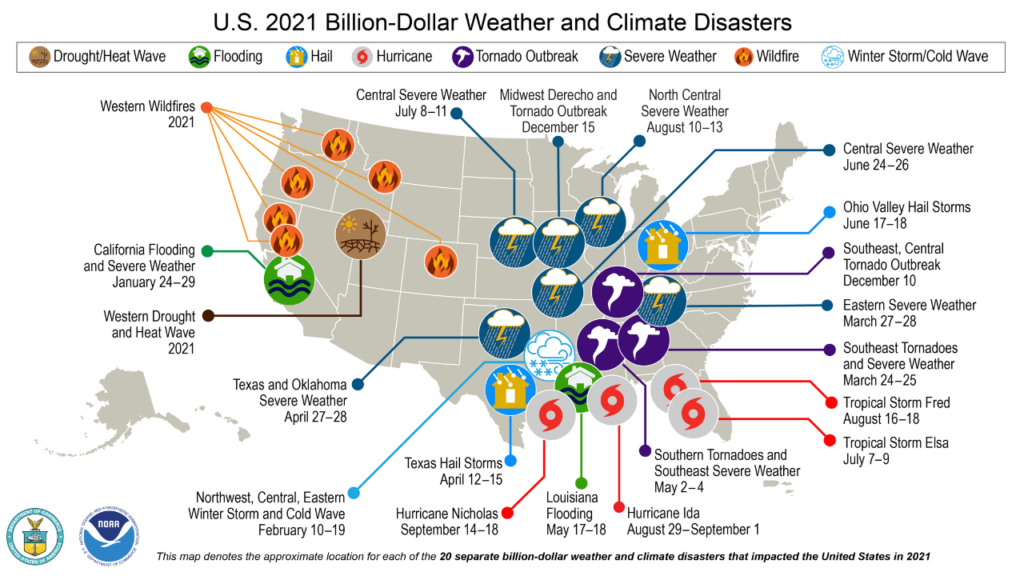Ways and Means to Adapt to Uncertain Ecological Change
Barter to avoid and repair deterioration or collapse of natural systems.
H4H Research Post: 17 May 2022
Overview
The U.S. has sustained 323 weather and climate disasters since 1980 where overall damages/costs reached or exceeded $1 billion (including CPI adjustment to 2022). The total cost of these 323 events exceeds $2.195 trillion.

2021 in Context…
In 2021, there were 20 weather/climate disaster events with losses exceeding $1 billion each to affect the United States. These events included 1 drought event, 2 flooding events, 11 severe storm events, 4 tropical cyclone events, 1 wildfire event, and 1 winter storm event. Overall, these events resulted in the deaths of 724 people and had significant economic effects on the areas impacted. The 1980–2021 annual average is 7.7 events (CPI-adjusted); the annual average for the most recent 5 years (2017–2021) is 17.8 events (CPI-adjusted).
Source:
NOAA National Centers for Environmental Information (NCEI) U.S. Billion-Dollar Weather and Climate Disasters (2022). https://www.ncei.noaa.gov/access/billions/
25% of U.S. Population Susceptible to Multiple Chemical Sensitivity, Dr. Bernhoft Says
In an interview with The Defender, Dr. Robin Bernhoft said, “Our current medical system, including much of our purportedly scientific research, is captured by the interests of pharmaceutical companies who put profits ahead of patients.”
By David Charbonneau, Ph.D.

Dr. Robin Bernhoft has Multiple Chemical Sensitivity (MCS), an illness he describes as “misunderstood and controversial” that affects up to 25% of the U.S. population.
Bernhoft also is the parent of a vaccine-injured child and the author of research papers on the link between autism and vaccines.
In an interview with The Defender, Bernhoft, an allergy and immune specialist with more than 46 years in the medical field, discussed MCS, vaccines, autism, COVID, and how profit and politics have warped medical care in America.
Bernhoft is director of the Bernhoft Center for Advanced Medicine in Ojai, California, and past president of the American Academy of Environmental Medicine.
He also is the author of more than 28 publications, including three books, and has testified at more than 60 trials as an expert witness in the field of environmental medicine and the treatment of MCS.
MCS-Aware, an advocacy organization, defines MCS as “a chronic, physical illness affecting people of all ages and backgrounds.”
MCS-Aware states:
“[MCS] causes sufferers to have allergic-type reactions to very low levels of chemicals in everyday products. Put simply the immune and detoxification systems stop working properly and the body cannot process toxins efficiently.”
“That’s a pretty good working definition,” Bernhoft said. He added:
“MCS is found in people who react with exposure to any chemical — car exhaust, perfume, paints, household chemicals, even new plastics in household items and chemicals in new clothing — with a variety of symptoms, including headache, respiratory distress, extreme fatigue and neurological symptoms, such as brain fog, dizziness and vertigo.”
Bernhoft described MCS as a disease in which the detoxification pathways of the human body become compromised due to genetics or environment, or a combination of the two.
“The body is like a rain barrel — you fill it up with toxic stuff and eventually it overflows with symptoms,” he said.
According to the National Resources Defense Council, more than 80,000 chemicals have been introduced into our environment since 1945. Very few of these were adequately tested for their impact on human health.
Underlying Assumptions
H4H Research Post: 17 May 2022
In terms of climate disasters, the economics of collapse are fairly straight forward. Businesses exist to make a profit. If they can't produce or deliver, they can't sell things. For example, when the supply chain breaks there is no delivery. This means they won't make profits, which means they are less able to employ you. So, more people lose their jobs or fear losing their jobs.
Apparently, population growth increases demand for goods and services and is a major driving force behind economic development. The result increases pressure on natural systems and resources. While the economy continues to expand, the ecosystem on which it depends does not.
Furthermore, there are natural indicators that show damage. For example, forests are shrinking, water tables are falling, soils are eroding, wetlands are disappearing, fisheries are collapsing, range lands are deteriorating, rivers are running dry, temperatures are rising, coral reefs are dying, plant and animal species are disappearing and waste that does not break down is accumulating.
These natural indicators help to identify thresholds for sustainable yields and mark loss or dematerialization of natural resources. In other words, natural indicators monitor the carrying capacity of Earth and the impact of economic development on natural resources and ecosystems. Regardless of cause, the threshold of deterioration or collapse of natural systems has been reached.
Individual power must now be called upon and applied to help work toward sustainable development. With an increase in understanding of relations between economics and nature, individual power grows. In other words - bottom up solutions. Bottom line is you have to have some other system which steps in and protects those things. The very last thing global industrial-military complexes want their citizens to wake up to is force majeure.
Habitat for Health offers Members what it can to provide food, clothing and shelter with the GAIA Fan club for less than $1 a day. And once settled and occupied, Members can save or invest time shares. In fact you can start or startup with investment in an H4H GFC franchise in a location and Eco-Eco time share you choose or design.
Oh, by the way, governments at all levels stand to get more votes of approval when they help ease economic effects of climate change, job loss, migration and from urban centers. Don't be afraid to ask your MPP or MP how to fund your own recovery in a GAIA Fan Club agricultural, employment, housing and transportation investment, barter and training opportunity. Please do mention that GAIA First contracts are fulfilled by you, your family and friends who work as Stewards to earn recurring payments by making sure the eco-eco loop continues.
Multiple Chemical Sensitivity
H4H Research Post: 15 May 2022
Brian Hack, founder of Habitat for Health, also has MCS. Dr. Donald Cole, Epidemiologist and consulting Occupational Physician at the Lakeshore Area Multi-Service Project (LAMP) in Toronto, Ontario diagnosed Brian more than 30 years ago.
While recovering, Brian attended the University of Waterloo, Environmental Studies via distance education. During that time he developed the concept of Habitat for Health. Since then he has built a research, writing and publishing Web business and in 2020 started up the GAIA Fan Club to share his knowledge, skills and personal experience living with MCS.
Today Brian's 30+ years of MCS experience avoiding, and where necessary optimizing recovery from exposure, to the most common triggers for MCS including petroleum-based solvents, volatile organic compounds, pesticides and synthetic fragrances is a keystone in building Habitat's for Health.
"You don't have to put yourself in harms way when Habitat for Health offers help to avoid exposures and protect you and your family from in a home where you can live and work."
Ways and Means to Adapt to Uncertain Economical Change
Invest in GFC sharecrop titles to live, grow, sublet and transport for economic certainty.
Agriculture
Feed a family a meal and you feed them for a day
Teach a family to farm and you feed them for the rest of their lives
Employment
Show a person greenhouse farming and they can grow all year long
Teach Permaculture to a farmer to increase quality, quantity & income
Housing
Show people how to build a house and you house them for life
Teach them how to sublet rooms and you increase their income
Transportation
Show a person how to drive a vehicle and their market grows
Teach a person to choose a vehicle and their market reach grows
